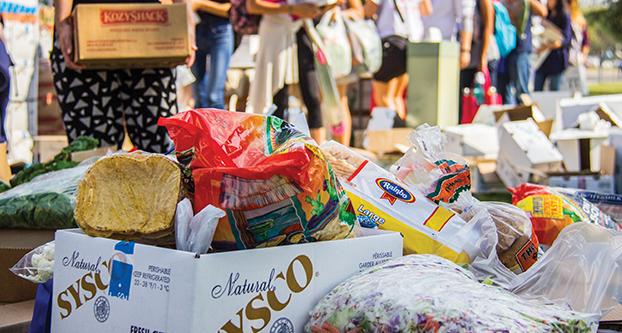As an undergraduate student at Fresno State, Alida Espinoza had a secret she didn’t dare tell anyone — she struggled with food shortages.
“I wasn’t talking about it to anyone — not my family, not my friends — because there was so much stigma associated with being poor,” said Espinoza, now a faculty member in the public health department. When Espinoza decided to go back for a graduate degree, she chose to research food insecurity.
“Now, there was a name to what I experienced,” she said.
The U.S. Department of Agriculture (USDA) defines food insecurity as, “limited or uncertain availability of nutritionally adequate and safe foods or being unable to obtain acceptable foods in socially acceptable ways.”
During her research, Espinoza found that one in three Fresno State students met the USDA criteria for food insecurity.
Chancellor Timothy White announced on Feb. 26 he would extend ongoing CSU-commissioned research, which found that 100,000 of the university system’s students could be affected by housing and food insecurity. In fall 2015, the CSU system had around 419,000 full-time and part-time undergraduates.
The study, titled “Serving Displaced and Food Insecure Students in the CSU,” was commissioned in February 2015 and began its first phase in April 2015.
The study found that 11 campuses had some sort of program for addressing student food insecurity, including Fresno State with its Food Security Project.
Today, the multi-initiative project includes the Catered Cupboard, a mobile app letting students know when food is available after a catered event; complimentary meals at the University Dining Hall; and the Student Cupboard, which opened in November 2014 and provides free food and hygiene items.
Coordinator Jessica Medina said the Food Security Project grew out of Espinoza’s research.
For her thesis, which was presented in May 2013, Espinoza chose to study students because of the lack of serious conversation regarding food security in college populations.
“You always hear about college students being broke and hungry and people laugh about it or they have these fond memories of how they would have to be smart with their money or budget their money,” Espinoza said. “A lot of what I got was a lot of people not thinking about food insecurity being a serious issue on campuses.”
“We think of college as being a place of privilege,” Espinoza said. “We think of college students as maybe having maybe a lot of financial support through family or scholarships or financial aid of some sort.”
The CSU-commissioned study found that an estimated 21 to 24 percent of the school system’s students are food insecure.
Any student in need of assistance from the Food Security Project can contact Jessica Medina at 559-278-0866 or jemedina@csufresno.edu.




